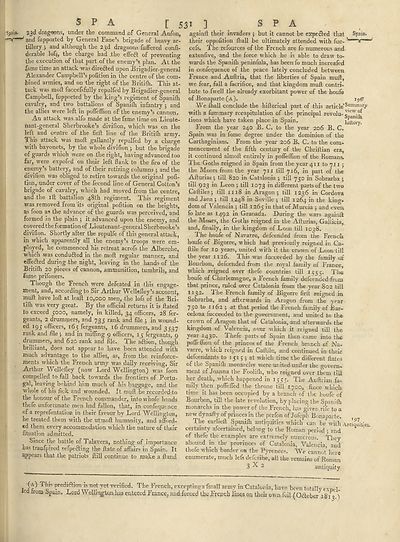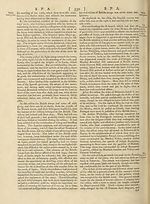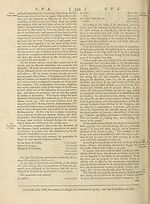Encyclopaedia Britannica, or, a Dictionary of arts, sciences, and miscellaneous literature : enlarged and improved. Illustrated with nearly six hundred engravings > Volume 19, Scripture-SUG
(579) Page 531
Download files
Complete book:
Individual page:
Thumbnail gallery: Grid view | List view

s p A [53
23d dragoons, under the command of General Anfon,
and fupported by General Fane’s brigade of heavy ar¬
tillery j and although the 23d dragoons fuffered confi-
derable lofj, the charge had the effeft of preventing
the execution of that part of the enemy’s plan. At the
fame time an attack was directed upon Erigadier-general
Alexander Campbell’s pofition in the centre of the com¬
bined armies, and on the right of the Britith. This at¬
tack was molt fuccefsfully repulfed by Brigadier-general
Campbell, fupported by the king’s regiment of Spanith
cavalry, and two battalions of Spanifh infantry j and
the allies were left in pofleffion of the enemy’s cannon.
An attack was alfo made at the fame time on Lieute¬
nant-general Sherbrooke’s divifion, which was on the
left and centre of the firft line of the Britifh army.
This attack was moft gallantly repulfed by a charge
with bayonets, by the whole divifion j but the brigade
of guards which were on the right, having advanced too
far, were expofed on their left flank to the fire of the
enemy’s battery, and of their retiring columns ; and the
divifion was obliged to retire towards the original pofi¬
tion, under cover of the fecond line of General Cotton’s
brigade of cavalry, which had moved from the centre,
and the ill battalion 48th regiment. This regiment
was removed from its original pofition on the heights,
as foon as the advance of the guards was perceived, and
formed in the plain ; it advanced upon the enemy, and
coveredtheformationof Lieutenant-general Sherbrooke’s
divifion. Shortly after the repulfe of this general attack,
in which apparently all the enemy’s troops were em¬
ployed, he commenced his retreat acrofs the Alberche,
which was conduced in the moft regular manner, and
effefled during the night, leaving in the hands of the
Britilh 20 pieces of cannon, ammunition, tumbrils, and
fome prifoners.
Though the French were defeated in this engage¬
ment, and, according to Sir Arthur Wellefley’s account,
muft have loft at leaf! 10,000 men, the lofs of the Bri¬
tifh was very great. By the official returns it is ftated
to exceed 5000, namely, in killed, 34 officers, 28 fer-
geants, 2 drummers, and 735 rank and file 5 in wound-
ed 195 officers, 165 fergeants, 16 drummers, and 3537
rank and file ; and in miffing 9 officers, 15 fergeants, 9
drummers, and 620 rank and file. The aiftion, though
brilliant, does not appear to have been attended with
much advantage to the allies, as, from the reinforce¬
ments which the French army was daily receiving, Sir
Arthur Wellefley (nowT Lord Wellington) was foon
compelled to fall back towards the frontiers of Portu¬
gal, leaving behind him much of his baggage, and the
whole of his lick and wounded. It muft be recorded to
the honour of the French commander, into whofe hands
thefe unfortunate men had fallen, that, in confequence
of a reprefentation in their favour bv Lord Wellington,
he treated them with the utmoft humanity, and afford¬
ed them every accommodation which the nature of their
fituation admitted.
Since the battle of Talavera, nothing of importance
has tranfpired refpe&ing the ftate of affairs in Spain. It
appears that the patriots ftill continue to make a ftand
Spam.
i5>6T
i ] SPA
againft their invaders ; but it cannot be expected that
their oppofition fhall be ultimately attended with fuc-
cefs. The refources of the French are fo numerous and
extenfive, and the force which he is able to draw to¬
wards the Spanifh peninfula, has been fo much increafed
in confequence of the peace lately concluded between
France and Auftria, that the liberties of Spain muft,
we fear, fall a facrifice, and that kingdom muft contri¬
bute to fwell the already exorbitant power of the houfe
of Bonaparte (a).
We fhall conclude the hiftorical part of this article*^ummary
with a fummary recapitulation of the principal revolu-slew-^f
tions which have taken place in Spain. hiitoiy!
From the year 240 B. C. to the year 206 B. C.
Spain was in fome degree under the dominion of the
Carthaginians. From the year 206 B. C. to the com¬
mencement of the fifth century of the Chriftian era,
it continued almoft entirely in poffeffion of the Romans.
The Goths reigned in Spain from the year 411 to 711 ;
the Moors from the year 711 till 716, in part of the
Afturias •, till 820 in Catalonia j till 750 in Sobrarba ;
till 923 in Leon ; till 1073 in different parts of the two
Caftiles; till 1118 in Aragon; till 1236 in Cordova
and Jaen ; till 1248 in Seville ; till 1264 in the king¬
dom of Valencia ; till r 265 in that of Murcia ; and even
fo late as 1492 in Granada. During the wars againft
the Mours, the Goths reigned in the Afturias, Gallicia,
and, finally, in the kingdom of Leon till 1038.
The houfe of Navarre, defcended from the French
houfe of Bigorre, which had previoufly reigned in Ca-
ftile for 10 years, united with it the crown of Leon till
the year 1126. This was fueceeded by the family of
Bourbon, defcended from the royal family of France,
which reigned over thefe countries till 1555. The
houfe of Charlemagne, a French family defcended from
that prince, ruled over Catalonia from the year 802 till
1132. The French family of Bigorre firft reigned in
Sobrarba, and afterwards in Aragon from the year
750 to 1162; at that period the French family of Bar¬
celona fucceeded to the government, and united to the
crown of Aragon that of Catalonia, and afterwards the
kingdom of Valencia, over which it reigned till the
year 1430. Thefe parts of Spain then came into the
poffeffion of the princes of the French branch of Na¬
varre, which reigned in CaftiLe, and continued in their
defeendants to 151 5 ; at which time the different ftates
of the Spanifli monarchy were united under the govern¬
ment of Joanna the Foolifli, who reigned over them till
her death, which happened in 1555. The Auftrian fa¬
mily then poffeffed the throne till 1700, fince which
time it has been occupied by a branch of the houfe of
Bourbon, till the late revolution, by placing the Spanifh
monarchs in the power of the French, has given, rife to a
new dynafty of princes in the perfon of Jofepb Bonaparte.
The earlieft Spanifh antiquities which can be with Antiaufties
certainty afeertained, belong to the Roman period ; and
of thefe the examples are extremely numerous. They
abound in tne provinces of Catalonia, Valencia, and
thofe which border on the Pyrenees. We cannot here
enumerate, much lefs deferibe, all the remains of Roman
3 2 antiquity
l ir ^ ^ PTedlTftl°’1 « n°t yet verified. The French, exceptinga fmall army in Catalonia, have been totally exnel
led from Spam. Lord \\ ellmgton lias entered France, and forced the French lines on their own foil (Oclcber i 813.)
23d dragoons, under the command of General Anfon,
and fupported by General Fane’s brigade of heavy ar¬
tillery j and although the 23d dragoons fuffered confi-
derable lofj, the charge had the effeft of preventing
the execution of that part of the enemy’s plan. At the
fame time an attack was directed upon Erigadier-general
Alexander Campbell’s pofition in the centre of the com¬
bined armies, and on the right of the Britith. This at¬
tack was molt fuccefsfully repulfed by Brigadier-general
Campbell, fupported by the king’s regiment of Spanith
cavalry, and two battalions of Spanifh infantry j and
the allies were left in pofleffion of the enemy’s cannon.
An attack was alfo made at the fame time on Lieute¬
nant-general Sherbrooke’s divifion, which was on the
left and centre of the firft line of the Britifh army.
This attack was moft gallantly repulfed by a charge
with bayonets, by the whole divifion j but the brigade
of guards which were on the right, having advanced too
far, were expofed on their left flank to the fire of the
enemy’s battery, and of their retiring columns ; and the
divifion was obliged to retire towards the original pofi¬
tion, under cover of the fecond line of General Cotton’s
brigade of cavalry, which had moved from the centre,
and the ill battalion 48th regiment. This regiment
was removed from its original pofition on the heights,
as foon as the advance of the guards was perceived, and
formed in the plain ; it advanced upon the enemy, and
coveredtheformationof Lieutenant-general Sherbrooke’s
divifion. Shortly after the repulfe of this general attack,
in which apparently all the enemy’s troops were em¬
ployed, he commenced his retreat acrofs the Alberche,
which was conduced in the moft regular manner, and
effefled during the night, leaving in the hands of the
Britilh 20 pieces of cannon, ammunition, tumbrils, and
fome prifoners.
Though the French were defeated in this engage¬
ment, and, according to Sir Arthur Wellefley’s account,
muft have loft at leaf! 10,000 men, the lofs of the Bri¬
tifh was very great. By the official returns it is ftated
to exceed 5000, namely, in killed, 34 officers, 28 fer-
geants, 2 drummers, and 735 rank and file 5 in wound-
ed 195 officers, 165 fergeants, 16 drummers, and 3537
rank and file ; and in miffing 9 officers, 15 fergeants, 9
drummers, and 620 rank and file. The aiftion, though
brilliant, does not appear to have been attended with
much advantage to the allies, as, from the reinforce¬
ments which the French army was daily receiving, Sir
Arthur Wellefley (nowT Lord Wellington) was foon
compelled to fall back towards the frontiers of Portu¬
gal, leaving behind him much of his baggage, and the
whole of his lick and wounded. It muft be recorded to
the honour of the French commander, into whofe hands
thefe unfortunate men had fallen, that, in confequence
of a reprefentation in their favour bv Lord Wellington,
he treated them with the utmoft humanity, and afford¬
ed them every accommodation which the nature of their
fituation admitted.
Since the battle of Talavera, nothing of importance
has tranfpired refpe&ing the ftate of affairs in Spain. It
appears that the patriots ftill continue to make a ftand
Spam.
i5>6T
i ] SPA
againft their invaders ; but it cannot be expected that
their oppofition fhall be ultimately attended with fuc-
cefs. The refources of the French are fo numerous and
extenfive, and the force which he is able to draw to¬
wards the Spanifh peninfula, has been fo much increafed
in confequence of the peace lately concluded between
France and Auftria, that the liberties of Spain muft,
we fear, fall a facrifice, and that kingdom muft contri¬
bute to fwell the already exorbitant power of the houfe
of Bonaparte (a).
We fhall conclude the hiftorical part of this article*^ummary
with a fummary recapitulation of the principal revolu-slew-^f
tions which have taken place in Spain. hiitoiy!
From the year 240 B. C. to the year 206 B. C.
Spain was in fome degree under the dominion of the
Carthaginians. From the year 206 B. C. to the com¬
mencement of the fifth century of the Chriftian era,
it continued almoft entirely in poffeffion of the Romans.
The Goths reigned in Spain from the year 411 to 711 ;
the Moors from the year 711 till 716, in part of the
Afturias •, till 820 in Catalonia j till 750 in Sobrarba ;
till 923 in Leon ; till 1073 in different parts of the two
Caftiles; till 1118 in Aragon; till 1236 in Cordova
and Jaen ; till 1248 in Seville ; till 1264 in the king¬
dom of Valencia ; till r 265 in that of Murcia ; and even
fo late as 1492 in Granada. During the wars againft
the Mours, the Goths reigned in the Afturias, Gallicia,
and, finally, in the kingdom of Leon till 1038.
The houfe of Navarre, defcended from the French
houfe of Bigorre, which had previoufly reigned in Ca-
ftile for 10 years, united with it the crown of Leon till
the year 1126. This was fueceeded by the family of
Bourbon, defcended from the royal family of France,
which reigned over thefe countries till 1555. The
houfe of Charlemagne, a French family defcended from
that prince, ruled over Catalonia from the year 802 till
1132. The French family of Bigorre firft reigned in
Sobrarba, and afterwards in Aragon from the year
750 to 1162; at that period the French family of Bar¬
celona fucceeded to the government, and united to the
crown of Aragon that of Catalonia, and afterwards the
kingdom of Valencia, over which it reigned till the
year 1430. Thefe parts of Spain then came into the
poffeffion of the princes of the French branch of Na¬
varre, which reigned in CaftiLe, and continued in their
defeendants to 151 5 ; at which time the different ftates
of the Spanifli monarchy were united under the govern¬
ment of Joanna the Foolifli, who reigned over them till
her death, which happened in 1555. The Auftrian fa¬
mily then poffeffed the throne till 1700, fince which
time it has been occupied by a branch of the houfe of
Bourbon, till the late revolution, by placing the Spanifh
monarchs in the power of the French, has given, rife to a
new dynafty of princes in the perfon of Jofepb Bonaparte.
The earlieft Spanifh antiquities which can be with Antiaufties
certainty afeertained, belong to the Roman period ; and
of thefe the examples are extremely numerous. They
abound in tne provinces of Catalonia, Valencia, and
thofe which border on the Pyrenees. We cannot here
enumerate, much lefs deferibe, all the remains of Roman
3 2 antiquity
l ir ^ ^ PTedlTftl°’1 « n°t yet verified. The French, exceptinga fmall army in Catalonia, have been totally exnel
led from Spam. Lord \\ ellmgton lias entered France, and forced the French lines on their own foil (Oclcber i 813.)
Set display mode to:
![]() Universal Viewer |
Universal Viewer | ![]() Mirador |
Large image | Transcription
Mirador |
Large image | Transcription
Images and transcriptions on this page, including medium image downloads, may be used under the Creative Commons Attribution 4.0 International Licence unless otherwise stated. ![]()
| Permanent URL | https://digital.nls.uk/192702809 |
|---|
| Attribution and copyright: |
|
|---|
| Description | Ten editions of 'Encyclopaedia Britannica', issued from 1768-1903, in 231 volumes. Originally issued in 100 weekly parts (3 volumes) between 1768 and 1771 by publishers: Colin Macfarquhar and Andrew Bell (Edinburgh); editor: William Smellie: engraver: Andrew Bell. Expanded editions in the 19th century featured more volumes and contributions from leading experts in their fields. Managed and published in Edinburgh up to the 9th edition (25 volumes, from 1875-1889); the 10th edition (1902-1903) re-issued the 9th edition, with 11 supplementary volumes. |
|---|---|
| Additional NLS resources: |
|

